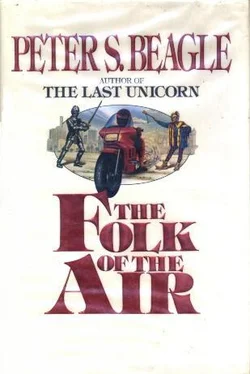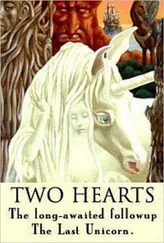Farrell, who had often sung the Scots ballad of the young girl who rescued her lover, body and soul, from the power of the Queen of the Fairies, could not help raising his eyebrows. The woman laughed outright, apparently unoffended. “Nay, do I not suit your imagining? Well, I am only recently become the Lady Janet—as late as the Birthday Revels I was still Draja the Tartar, raider and rebel, pitiless enemy of all who dare her mountain fastness.” Farrell remembered her, a shrilling apparition in a red wig and gilded leather mail, clutching two spears even when she danced. “But it got so boring,” the Lady Janet went on. “Say what you will, there’s no one really likes a constant outlaw, and the whole life style is just dull after a while. So I packed up Draja, bag and baggage—all her weapons, her armor, all her nasty little gods and charms and endless family legends, and her one bloody company formal—and I just sold her to Margrethe von der Vogelweide, who is so tired of being Duke Manfred’s operetta duchess she’ll take to any hills she can find. And behold, the demure but passionate Janet of Carterhaugh, who defied all Elfland for her love, and dresses much better than poor Draja besides.” She made him a deep and unexpectedly elegant curtsy and rose winking.
Farrell said slowly, “You can do that? Just stop being whoever you are in the League and decide to be someone absolutely different? You can sell characters, trade them off?” He felt oddly disoriented, almost offended.
“Personas,” the Lady Janet corrected him. “Or we call them impressions. Aye, of a certainty, we barter and alter and retire them as we choose, and no constraint but to register the change with the College of Arms.” Her sugar-white face grew damply pink as she continued. “I’faith, ‘twould be intolerable else. What, should we be bound eternally to the same outworn impression, any more than to a single manner of dress, to one ambition, one mate, one nose? This may be the Middle Ages, good musicker, but it is still California.”
A Siamese kitten who had been fearlessly scampering through all the rooms at once all evening bounced stifflegged up to them to investigate the wonderful secrets of the Lady Janet’s trailing hem. She swooped him up to nip fiercely at her chin, telling Farrell, “Behold Sir Mordred, so named because he is so wicked, wicked, wicked .” The last words were half smothered in the kitten’s fur.
Farrell asked, “Does that happen a lot? I mean, are people changing their characters all the time?”
The Lady Janet laughed into Sir Mordred’s belly, and he promptly boxed her ears. “Nay, ‘tis hardly as common as that. There are many like the Lady Criseyde or the Lord Garth, whose impressions vary not a jot from one Whalemas Tourney to the next, except to grow richer and more sure. But for those of us more fickle, the true delight lies in becoming exactly whom we choose, as deeply as we choose, and for exactly as long. Before Draja, I was Lucia la Sirena, flame of old Castile, and I may well be Marian of Sherwood tomorrow, or Melusine the Dragon Lady, and no one to look twice at me for it. Squire Tancred, Geoffrey of Eastmarch, will you knock it off ?”
Two of the boys Farrell had been chatting with earlier came hurtling past the buffet, half-racing, half-wrestling, yelling in breathless, hysterical voices, “Caitiff, miscreant, I’ll have thy guts for garters!” Sir Mordred snarled, slashed the air indignantly, and tried to climb the Lady Janet’s headdress. One boy managed to wave apologetically to her as they vanished under the table; miraculously, they scrambled out on the other side without crashing into the legs or pulling the cloth and trays down with them. Farrell could follow their riotous progress across the room by the wave of robes and gowns being swept hastily out of their way.
“Toenails of the Virgin, a murrain on the pair of them!” the Lady Janet spluttered as Farrell carefully removed Sir Mordred from her hair and set him on the floor. “E’er since Tancred became squire to Cedric the Bowman, the brat’s been tormenting my Geoffrey to distraction. Pox on’t, but I must needs go deal with the wretched little rug-rats.” She curtsied again to Farrell and began to turn away.
“You live here,” Farrell said. “What’s it like for you, living here all the time?” The Lady Janet looked back at him saying nothing, smiling now. Farrell asked, “I mean, do you eat out much? Do you have friends where you work, do you and your family ever go to the movies, do you take the car in for tuneups? What is it like all the time?” Why should I be the one feeling like an idiot? Am I the one with a kid fighting over who gets to be a squire ?
The Lady Janet paused and fanned her damp bosom, all the while watching Farrell out of steady small eyes the color of faded denim. She said, “I know how to put quarters in a parking meter, if that’s your notion of the real world. I have to know that, because we have no student lot at my law school. I can also balance a checkbook, send out for pizza, and help Geoffrey of Eastmarch with his computer class homework. Does that answer your question, my Lord of Ghosts and Shadows?”
A sudden sharp rise in the noise level made both of them turn quickly to see a burly knight in full chain mail hoisting himself onto the buffet table, kicking a chair over behind him as he did so. He gripped a slopping flagon in one hand and was beginning his speech or his song—it was difficult to be sure—with one booted foot in the frumenty. Even through the redoubled cheering and stamping, Farrell could hear the Lady Janet’s squall of outrage as she charged the buffet, reverting instantly to Draja the Tartar. The knight saw her coming, dropped his flagon, and started to climb down.
Farrell drifted on, looking for Julie and trying not to step on Sir Mordred, who kept exploding out of shadows to launch ruthless kamikaze attacks on Farrell’s ankles and vanish instantly behind a mounted suit of armor or a half-painted shield leaning in a corner. One of the assaults was providential, diverting the attention of the Lady Vivienne d’Audela, who was just settling in for a good teary chat about her hopeless crush on Hamid ibn Shanfara. Another effectively broke up an impromptu Basilisk rendition of “ When I’m Sixty-Four ,” performed as a serenade to Sir Tybalt and the Lady Alisoun, caught necking in an alcove. Farrell had a serious talk with the kitten at that point, and Sir Mordred promised faithfully to be good, but he lied.
The Lady Criseyde, involved in hasty repairs to the gravysplashed ruff of King Bohemond, paused to say that the Lady Murasaki had gone out but now into the courtyard, complaining of the noise and stuffiness. A branle was forming in the hallway like a fifteenth-century conga line, accompanied only by Felix Arabia on shawm, resembling a Bosch demon in a genial moment. He caught sight of Farrell and called to him, beckoning over the dozen cowls, plumed berets, and steepled hennins jigging between them. Farrell smiled, waved back, and ducked swiftly across the hall into a room he had not seen before. It was smaller than the others, less well-lighted, with a smell of old neglect about it, as if every celebration since the housewarming had passed it by. Yet there were fresh rushes scattered here, too— where do you go to get real castle rushes in Avicenna, California ?—and a few tapestries and small rugs taking a bit of the chill from the walls; and by the far wall, directly under the one stone slash of a window, Nicholas Bonner crouched on the floor with a boy who could not have been older than four. They were building a castle of their own together out of red and yellow bricks.
Farrell never knew how long he stood watching them. The room was rarely deserted; he was distantly but continually aware of people, wandering in and out, and of voices joking in the League talk about the perfect concentration of the two children. Neither one ever looked up. Farrell recognized the boy as the Lady Alisoun’s nephew and solemn-eyed ringbearer. Nicholas was teaching him the words for the different parts of the castle as they took shape in clicking red and yellow. “There we are, Joshua, that’s the barbican all done. Can you say that, barbican ?” Joshua giggled and said it correctly. “Oh, very good. Okay, now we have to make a proper postern gate in our curtain wall— postern , Joshua, I’ll do that one, and you put a few more guard towers on the wall, okay? You do good towers.”
Читать дальше












